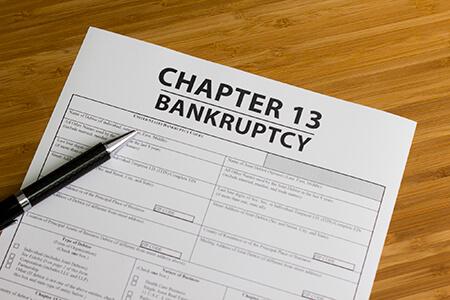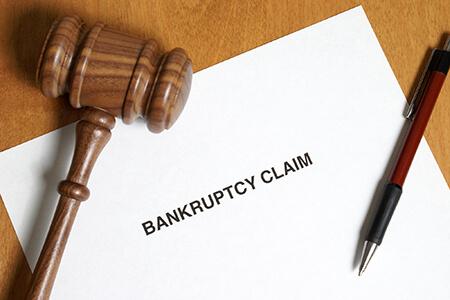(623) 777-4760

For most people, chapter 7 bankruptcy is the preferred choice of filing bankruptcy because it is over quickly and in most cases the debtor does not lose any money or property to the court. However, there are times when it becomes necessary to look at chapter 13 bankruptcy.
There are 2 instances that occur most often, which cause bankruptcy debtors to file chapter 13 bankruptcy rather than chapter 7 bankruptcy. First, the debtor doesn't qualify for chapter 7 because their income is too high. In bankruptcy law, a median income is set for debtors in chapter 7.
A six-month average of all income from all sources is tallied and an average is taken. If the debtor's income is higher than the median set for chapter 7 bankruptcy, then the debtor is forced into chapter 13 bankruptcy.
A good bankruptcy attorney may be able to plan around this problem by waiting to file when income is lower. In some cases, the debtor received a boost of income from a bonus or overtime. When that happens, the debtor can wait until that larger paycheck falls off the six-month average to file. But, if all that fails, then the debtor must declare chapter 13 bankruptcy.
Second most common reason for chapter 13 filers is because the debtor has assets, he or she would lose in chapter 7, therefore, the debtor must look to filing chapter 13 bankruptcy to avoid the court from taking those assets. This may occur for several reasons including, the debtor has more vehicles than what can be protected, higher equity than what the bankruptcy law allows, or any other unexempt or unprotected property that the debtor does not want to turn over to a chapter 7 trustee. When that happens, a chapter 13 is to only way to protect that property.
A debtor in chapter 13 bankruptcy is afforded all the same protections as a chapter 7 bankruptcy debtor. The debtor receives the automatic stay, which prevents creditors from seeking to sue, garnish, levy, repossess, foreclose on any of the debtor's property. Creditors are forbidden from contacting the debtor for any reason, including reporting on credit, through mail or phone, and email. The debtor also is given the same protections for their property called exemptions. The exemptions protect your property from being taken by a trustee or the court. It is recommended that any debtor wanting to file a chapter 13 should speak with a competent and knowledgeable chapter 13 bankruptcy attorney prior to filing any chapter 13 case. Bankruptcy law is complex, and it takes an experienced bankruptcy lawyer to know the ins and outs of chapter 13 bankruptcy. Therefore, a Chapter 13 bankruptcy stops creditors form doing the following:
Chapter 13 bankruptcy is a reorganization of the bankruptcy filer's debt into a plan for repayment. Upon filing a chapter 13 bankruptcy, the debtor must submit a chapter 13 plan to the court for review. Creditors will have the opportunity to file claims to the bankruptcy court stating the amount they believe is owed. Just as in chapter 7 bankruptcy, once your case is filed, a chapter 13 bankruptcy trustee will be assigned to your case. The main difference between chapter 7 bankruptcy and chapter 13 bankruptcy is the chapter 13 trustee will be looking to pay the claims filed by creditors from the payments made from the debtor. The trustee will also determine if the plan meets the bankruptcy law and each creditor is treated properly. The debtor will need to attend a hearing with the chapter 13 trustee to be questioned under oath. After the hearing, the trustee will review the plan submitted by the debtor and all claims submitted by creditors. Then, the trustee will be requiring the debtor to confirm the plan based on recommendations the trustee provides. Once confirmed, the plan is set. Chapter 13 bankruptcy plans typically last from three to five years depending on the debtor's circumstances. Plan payments must be made each month during the pendency of the bankruptcy.
Debtors have different types of claims in their plan. Secured claims are anything purchased by the debtor in which the item or property purchased is collateral securing the loan. For example, a house or car are typical secured debts because the house or car is the collateral for the loan. Another type of claim is Priority debt. There are two common Priority debts, which are taxes owed to either the federal or state government or past due domestic support obligations such as child support or spousal maintenance. Lastly, most all other debts are considered unsecured, which are

Chapter 13 bankruptcy plans will pay off the debt in order of secured, then Priority, and lastly unsecured. Another common reason for filing chapter 13 bankruptcy is to avoid foreclosure or repossession. If you are behind on mortgage or car payments and the lender is threatening foreclosure or repossession, in most cases, chapter 13 bankruptcy is the only chapter of bankruptcy that will save your property and allow you to pay off those arrearages in time through the chapter 13 bankruptcy plan.
The chapter 13 bankruptcy plan is drafted so that the debtor can pay their creditors based on how much income the debtor makes. In most cases, the debtor's income is taken, minus expenses, then there must be some amount of money that can be paid into the chapter 13 plan to pay off all necessary debts. Under bankruptcy law, the debtor must be able to pay off any secured debt and Priority debt before the plan will be determined as feasible and approved by the court. If those debts cannot be paid in full during the lifetime of the plan, the court will not approve the plan and the debtor may be forced out of bankruptcy or converted to chapter 7 bankruptcy. The second part of the plan is the chapter 7 liquidation test. If the debtor has assets they would have lost to a chapter 7 trustee, then the value of those assets must be calculated into the plan. It's akin to buying your own property back in the plan.
Five years is a long time to be in bankruptcy and many things can happen over the five-year period. For example, job changes, increase or decrease in income, the need for a new car or to have to sell your property. When these things happen, the bankruptcy law provides for remedies. The debtor can ask for permission to incur new debt, buy a new car, sell a property. Or if income has gone down, the debtor can ask for a break from payments if the decrease in income was temporary, or conversion to chapter 7. If all else fails, and the debtor cannot afford to be in chapter 13, debtors have the right to dismiss their case at any time in most cases.
Once all the payments have been made, and the debtor has followed all the procedures for discharge, the court will enter an order discharging any remaining unpaid debt, which was not paid during the plan. The debtor will not be responsible for payment to those creditors discharged and those creditors are forbidden from contacting the debtor for any reason. Shortly after discharge, the court will close the case officially and bankruptcy is over.
I was stressed out for my own reasons, but Jim was a great lawyer and helped me accomplish what I went to him for. I recommend him if you are looking to file bankruptcy. He definitely knows what he is doing. I basically stressed for nothing.
I would highly recommend Jim to anyone. He was very easy to work with and explained everything and helped the process go smoothly. Made us feel at ease during the whole process. Also answered our question in a timely manner which was very much appreciated.
Jim and his staff were very pleasant to deal with; very helpful in a difficult time. Jim was very thorough in explaining options and made the process as painless as possible. Christina stayed on top of everything, was very helpful and professional. I would highly recommend.
The filing of a bankruptcy is a big decision for anybody. There are many reasons a person, family or business finds themselves in the unfortunate situation that bankruptcy is on the table. Bankruptcy should be a last resort decision, meaning you have tried all other avenues to clear up debt, stay current on mortgage and car payments, and continue to pay basic living expenses like food and utilities. But when does it make sense to file bankruptcy? Here are some ideas to help with your decision.
Filing bankruptcy does not need to mean you failed as a person, family or business. Many times, life events happen that are out of our control. These times are when you need to reach out to get the help you need to recover. Call our Glendale, Arizona bankruptcy office today for a free consultation.